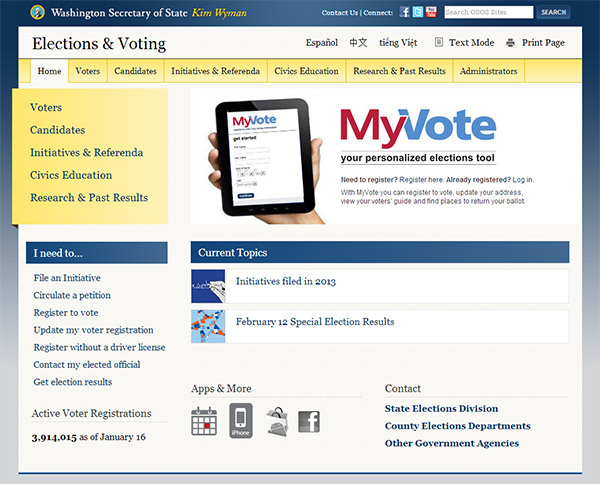Study: WA has one of top elections websites in U.S.
Over the years, your state Elections Division has been recognized as a national leader in innovation and voter services. Now, it’s received a shout-out for having one of the best state elections websites in the nation.
The Center for Government Studies has released a study of states’ elections websites and the information they provide. Go here to see the report.
Washington’s Elections Division received the lone “B” grade with a score of 81 percent. Alaska and California tied for first with 90 percent, making them the only two states to earn an “A.” Oregon ranked fourth with a 71 score, giving our neighbors across the Columbia River the only “C.” Forty-six states and the District of Columbia were given a “D” or “F.” Pennsylvania had the lowest score at 19 percent. The overall median score for all states was 47 percent.
The report gave this review of our state’s website:
“Washington’s state election website provides much of the candidate information voters need to make informed decisions at the ballot box. The site provides voters with candidate lists, candidate photos, elected experience, other professional experience, education, community service, platform statements, phone numbers and email.”
Washington Elections Director Lori Augino was pleased with how our state fared in the study:
“Our Elections Division takes pride in having a website that provides voters with comprehensive and helpful information on candidates, ballot measures and general information about elections. It’s encouraging to see this report give our state a positive review.”
The report’s state assessment tool included 30 questions dealing with candidate information, ballot measure information and general information.
The candidate information section looked at candidate lists for state and federal office, party affiliation, incumbency status, occupation, contact information, candidate statements, campaign finance data, elective office job descriptions, political parties links, candidate information in either or audio or video formats and candidate debate links. Washington ranked third nationally, receiving an 83 percent. Alaska and California tied for first with 90 percent.
For ballot measure info, the study examined: summary of measure, text of measure, pros and cons supplied by proponents and opponents, nonpartisan analyses and fiscal analyses. Washington shined brightest in this category, being one of four states to earn a 100 score (Alaska, California and Nevada were the others).
The general information section included: voter information in enlarged type-face for voters living with visual disabilities, candidate and ballot measure information in a “voter pamphlet” and lookup tools that provide precinct level sample ballots. This was the one area where Washington graded poorly, receiving only a 33 percent that resulted in an “F.”
“We’ll study the results and recommendations in this report and continue to improve upon an already terrific website,” Augino said.
